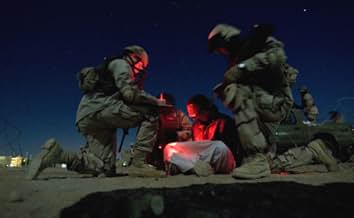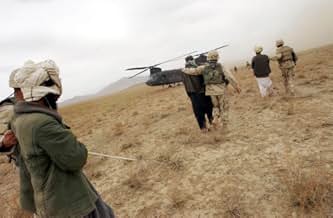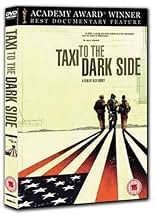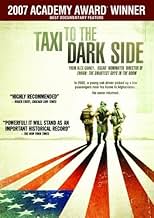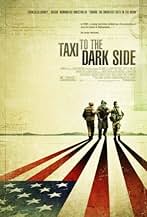NOTE IMDb
7,5/10
17 k
MA NOTE
Ajouter une intrigue dans votre langueAlex Gibney exposes the haunting details of the USA's torture and interrogation practices during the War in Afghanistan.Alex Gibney exposes the haunting details of the USA's torture and interrogation practices during the War in Afghanistan.Alex Gibney exposes the haunting details of the USA's torture and interrogation practices during the War in Afghanistan.
- Récompensé par 1 Oscar
- 10 victoires et 5 nominations au total
Alex Gibney
- Narrator
- (voix)
Moazzam Begg
- Self - Torture Victim
- (as Moazzam Beg)
George W. Bush
- Self
- (images d'archives)
Jack Cafferty
- Self
- (images d'archives)
Dick Cheney
- Self
- (images d'archives)
Lynndie England
- Self
- (images d'archives)
Tommy Franks
- Self - General
- (images d'archives)
Avis à la une
Yep, it is another one of those Iraq and Afghanistan documentaries. I know the burnout rate is high on these, which is probably why I almost did not bother, but nothing else was showing. Man, was I happy I saw this! It has rekindled my hate for the Bush administration, which had turned to apathy over the last year. This tells the story of an Afghani taxi driver that is mistakenly picked up as a Taliban supporter, but before they find out he was innocent, he has been beaten to death by his American torturers.
This film has interviews from all of the guards that were responsible, JAG officers, FBI people, CIA agents on the ground etc. And you see that all of the blame lies with Ashcroft and the Bushies, who gave one vague order after another that they wanted confessions and they wanted them quickly, with a wink and a nod about what kind of methods to use. So you have these frustrated high school drop-outs presiding over these people thousands of miles from anywhere, and they won't confess. So, beatings and humiliations follow. And when the crap comes out, the Bush administration passes a bill that absolves all higher-ups from any responsibility and they start to bust the enlisted men and women, who were following orders. Pathetic. Of course, we also find out that over 95% of the prisoners being held, were captured by Pakistanis and Northern Alliance people, WHO were paid by the US government for each person they turned over, guilty or not guilty. And you wonder why meaningful confessions were so hard to come by. It reminds me of the scene from Full Metal Jacket, where the psycho army guy shoots the Vietnamese farmers from his helicopter. He says the ones that run are VC, the ones that don't run are well trained VC. Very tragic.
This film has interviews from all of the guards that were responsible, JAG officers, FBI people, CIA agents on the ground etc. And you see that all of the blame lies with Ashcroft and the Bushies, who gave one vague order after another that they wanted confessions and they wanted them quickly, with a wink and a nod about what kind of methods to use. So you have these frustrated high school drop-outs presiding over these people thousands of miles from anywhere, and they won't confess. So, beatings and humiliations follow. And when the crap comes out, the Bush administration passes a bill that absolves all higher-ups from any responsibility and they start to bust the enlisted men and women, who were following orders. Pathetic. Of course, we also find out that over 95% of the prisoners being held, were captured by Pakistanis and Northern Alliance people, WHO were paid by the US government for each person they turned over, guilty or not guilty. And you wonder why meaningful confessions were so hard to come by. It reminds me of the scene from Full Metal Jacket, where the psycho army guy shoots the Vietnamese farmers from his helicopter. He says the ones that run are VC, the ones that don't run are well trained VC. Very tragic.
This horrifying documentary won the Oscar for 2007. Using the case of an innocent Afghan taxi driver who were tortured to death by American interrogators in Bagram prison as the starting point, the film chronicles the atrocities committed by the Bush administration in the name of American people and an ill-defined 'war on terror'.
The film is written, directed and narrated by Alex Gibney, son of a high-ranking naval officer who was an interrogator in World War II. A great American and a true patriot, Frank Gibney's final disappointment of what became of the great nation of the United States in the hands of a few liars is heart-wrenching.
There is not a single frame in the film that is not supported by hard evidence. All of the investigation was conducted by Americans whose credentials of decency and patriotism are above suspicion. The film is a chronicle of how paranoia, self-serving deceit and mere stupidity can threaten the very values a great nation was built on. It should be impossible for anyone who watches this meticulous document to ever criticize the veracity of claims put forward by the recent films, Rendition, In the Valley of Elah, or Redacted - flawed as films though that they were.
Every person in the world, especially every American, that cares about the true nature of freedom and the sanctity of the individual (the basic tenets on which America was built) should see this film. How could anyone claim that it would be loved only by the supporters of Taliban is beyond me.
The film is written, directed and narrated by Alex Gibney, son of a high-ranking naval officer who was an interrogator in World War II. A great American and a true patriot, Frank Gibney's final disappointment of what became of the great nation of the United States in the hands of a few liars is heart-wrenching.
There is not a single frame in the film that is not supported by hard evidence. All of the investigation was conducted by Americans whose credentials of decency and patriotism are above suspicion. The film is a chronicle of how paranoia, self-serving deceit and mere stupidity can threaten the very values a great nation was built on. It should be impossible for anyone who watches this meticulous document to ever criticize the veracity of claims put forward by the recent films, Rendition, In the Valley of Elah, or Redacted - flawed as films though that they were.
Every person in the world, especially every American, that cares about the true nature of freedom and the sanctity of the individual (the basic tenets on which America was built) should see this film. How could anyone claim that it would be loved only by the supporters of Taliban is beyond me.
In 2002 taxi driver Dilawar was picked up by US forces with his passengers in the desert and taken to Bagram prison in Afghanistan. Five days later he was dead. Injuries to his legs were compared with those he would have sustained if he had been run over by a truck had he lived it was likely that his legs would have had to have been amputated due to the damage. With this as the starting point, this documentary tells the story of the role of "torture" in the war on terror, from Abu Ghraid to Guantanamo.
Having put Gibney's documentary on Enron as one of my ten favourite films of 2005, I eagerly took up the opportunity the UK (and much of Europe) had to catch this on television ahead of the full release in the US in 2008. Shown as part of the BBC's excellent "Why Democracy" series of films, this one opened with the caption question "can terrorism destroy democracy?". To the casual listener the question appears to be about the ability of terrorists to bring down what we see as Government (ie by crashing planes into it) but really the question in regards this film appears to be more about whether our idea of freedom and democracy can survive the way we fight terrorism. As a result this film is about the use of "torture" against terrorist suspects, specifically focusing on the United States.
The reader may be wondering why the focus (in the title) on Dilawar. Well I did too because he died in Bagram and his story sadly ends there, while the vast majority of the film focuses on the infamous examples of torture and inhumane treatment in the other places. Well it turns out that Dilawar is a device and one that the film uses very well. The morality of the use of torture is not black and white and of course the usual "ticking time bomb" scenario is thrown up; the film does counter this by suggesting that the weekly scenarios in Fox's 24 are not the norm (to say the least) but the best answer to most of the moral questions are simply to refer back to a taxi driver who died after five days in captivity with horrific injuries the film doesn't say he was innocent but it doesn't need to nobody suggests he was evil or a key player either, but yet he is dead. This hangs over the film even though he is not the focus after the first twenty minutes.
What the film does from then on in is paint a picture of lack of respect for humanity, lack of respect for international laws, lack of accountability and lack of transparency. The film plays a clip of Rumsfeld speaking on the (then) allegations of mistreatment and says that it will be looked into so that "the world will see how a free system, a democratic system, functions and operates"; well he was right and it is not pretty viewing. As with Enron, Gibney does betray his politics and the film has very little in the way of even handedness about the debate. This is a little disappointing in regards the debate but the overwhelming nature of the presentation of arrogance and carelessness did make wonder how you would balance these issues certainly the quotes I have heard down the years from politicians have not been able to convince. Certainly a clip of Bush talking about "suspected terrorists" who have died, or as he says "put it this way they're no longer a problem to the United States"; the fact that he acknowledges they are "suspects" rather than convicts but yet sees their death as a good thing says it all.
Considering this issue is everywhere in the media, Gibney does very well to structure his film to build it from the ground up. Not only does he use the words of the Bush administration against them ("the only thing I know for certain is that these are bad people") but he also details the wider political picture beyond the blame that was dumped onto Lynndie England, Charles Graner and others. He does this very well, bringing in the input of John Yoo and the terribly smarmy Alberto Gonzales. Even after the photographs in the paper, seeing the unedited video and hearing firsthand accounts from both sides is shocking and disturbing affair again, how would you set out to "balance" these? Beyond the issue of torture I found the lack of accountability and ownership to be just as shocking as privates are floated down the river while those in charge never face worse than early retirement. The biggest challenge with this material is to keep it as a valid piece of work even as the topic grows daily and that many will be tired of hearing about it just this last week or so we have seen more debate and also the CIA deleting old tapes of interrogations (tapes that Bush has "no recollection" of existing); however Gibney brings the film to a close well, making it feel like something that can stand still and still work the personal touch of his late father's comments at the end (himself a WWII Navy interrogator) talking about how "we" should be different than "them", making for a suitable summing up of why the film is important.
Another strong documentary from Gibney despite the lack of balance and the challenges with the topic. It deserves to be seen by a bigger audience than it has been, even if it won't make the difference it should do. Depressing to think that, decades from now people will look back on this and wonder how on earth we allowed our leaders to do this in our names and let them get away with it.
Having put Gibney's documentary on Enron as one of my ten favourite films of 2005, I eagerly took up the opportunity the UK (and much of Europe) had to catch this on television ahead of the full release in the US in 2008. Shown as part of the BBC's excellent "Why Democracy" series of films, this one opened with the caption question "can terrorism destroy democracy?". To the casual listener the question appears to be about the ability of terrorists to bring down what we see as Government (ie by crashing planes into it) but really the question in regards this film appears to be more about whether our idea of freedom and democracy can survive the way we fight terrorism. As a result this film is about the use of "torture" against terrorist suspects, specifically focusing on the United States.
The reader may be wondering why the focus (in the title) on Dilawar. Well I did too because he died in Bagram and his story sadly ends there, while the vast majority of the film focuses on the infamous examples of torture and inhumane treatment in the other places. Well it turns out that Dilawar is a device and one that the film uses very well. The morality of the use of torture is not black and white and of course the usual "ticking time bomb" scenario is thrown up; the film does counter this by suggesting that the weekly scenarios in Fox's 24 are not the norm (to say the least) but the best answer to most of the moral questions are simply to refer back to a taxi driver who died after five days in captivity with horrific injuries the film doesn't say he was innocent but it doesn't need to nobody suggests he was evil or a key player either, but yet he is dead. This hangs over the film even though he is not the focus after the first twenty minutes.
What the film does from then on in is paint a picture of lack of respect for humanity, lack of respect for international laws, lack of accountability and lack of transparency. The film plays a clip of Rumsfeld speaking on the (then) allegations of mistreatment and says that it will be looked into so that "the world will see how a free system, a democratic system, functions and operates"; well he was right and it is not pretty viewing. As with Enron, Gibney does betray his politics and the film has very little in the way of even handedness about the debate. This is a little disappointing in regards the debate but the overwhelming nature of the presentation of arrogance and carelessness did make wonder how you would balance these issues certainly the quotes I have heard down the years from politicians have not been able to convince. Certainly a clip of Bush talking about "suspected terrorists" who have died, or as he says "put it this way they're no longer a problem to the United States"; the fact that he acknowledges they are "suspects" rather than convicts but yet sees their death as a good thing says it all.
Considering this issue is everywhere in the media, Gibney does very well to structure his film to build it from the ground up. Not only does he use the words of the Bush administration against them ("the only thing I know for certain is that these are bad people") but he also details the wider political picture beyond the blame that was dumped onto Lynndie England, Charles Graner and others. He does this very well, bringing in the input of John Yoo and the terribly smarmy Alberto Gonzales. Even after the photographs in the paper, seeing the unedited video and hearing firsthand accounts from both sides is shocking and disturbing affair again, how would you set out to "balance" these? Beyond the issue of torture I found the lack of accountability and ownership to be just as shocking as privates are floated down the river while those in charge never face worse than early retirement. The biggest challenge with this material is to keep it as a valid piece of work even as the topic grows daily and that many will be tired of hearing about it just this last week or so we have seen more debate and also the CIA deleting old tapes of interrogations (tapes that Bush has "no recollection" of existing); however Gibney brings the film to a close well, making it feel like something that can stand still and still work the personal touch of his late father's comments at the end (himself a WWII Navy interrogator) talking about how "we" should be different than "them", making for a suitable summing up of why the film is important.
Another strong documentary from Gibney despite the lack of balance and the challenges with the topic. It deserves to be seen by a bigger audience than it has been, even if it won't make the difference it should do. Depressing to think that, decades from now people will look back on this and wonder how on earth we allowed our leaders to do this in our names and let them get away with it.
Too few have heard of Dilawar. Those who have will probably never forget him. Alex Gibney certainly will not. His latest film starts and ends with this poor innocent taxi driver who, in 2002, was taken to the Bagram airbase in Afghanistan. Five days later, he was dead.
Dilawar's death was the spark which ultimately led to the international awareness of what the Bush administration was doing to its detainees in the war on terror. Gibney's film, however, decides to look up the tree, not down, to discover who was really responsible for these unpleasant developments.
Gibney's film is bolstered by frank and interesting interviews with some of the troops on the ground. Their remorse is clear, as is their disgust. And disgust is the right word. This is, by no means, an easy watch. The use of the appalling footage which has been generated by the recent conflicts is necessary because, if anyone is in any doubt about how morally reprehensible these tactics are, this film will make it abundantly clear.
However, this film's real strength is the structure of its attack on the tactics that are employed. Gibney demonstrates that the tactics used are hopelessly inadequate and never yield effective information. There is a cutting and brilliant comparison with the old techniques and the new where an interviewee, a former FBI interrogator, uses his old tools of interrogation words and you can feel yourself being persuaded.
This is not just a polemic. It is a human story and a powerful and well-constructed argument. It should be essential viewing as what has happened at Guantanamo, Bagram and Abu Ghraib should never be forgotten. This is excellent, important film-making.
4 Stars out of 5
Dilawar's death was the spark which ultimately led to the international awareness of what the Bush administration was doing to its detainees in the war on terror. Gibney's film, however, decides to look up the tree, not down, to discover who was really responsible for these unpleasant developments.
Gibney's film is bolstered by frank and interesting interviews with some of the troops on the ground. Their remorse is clear, as is their disgust. And disgust is the right word. This is, by no means, an easy watch. The use of the appalling footage which has been generated by the recent conflicts is necessary because, if anyone is in any doubt about how morally reprehensible these tactics are, this film will make it abundantly clear.
However, this film's real strength is the structure of its attack on the tactics that are employed. Gibney demonstrates that the tactics used are hopelessly inadequate and never yield effective information. There is a cutting and brilliant comparison with the old techniques and the new where an interviewee, a former FBI interrogator, uses his old tools of interrogation words and you can feel yourself being persuaded.
This is not just a polemic. It is a human story and a powerful and well-constructed argument. It should be essential viewing as what has happened at Guantanamo, Bagram and Abu Ghraib should never be forgotten. This is excellent, important film-making.
4 Stars out of 5
With a title like Taxi to the Dark Side, you know it's not going to be a light-and-fluffy film, but it's a film that needed to be made, and should be seen by everyone.
The measure of a nation is how well it lives up to its ideals in the worst of times. 9/11 was that trial for America, and America failed. If you do not believe that former U.S. president George W. Bush, former vice president Dick Cheney, Secretary of Defense Donald Rumsfeld, White House Council John Yoo, and at least a half dozen other members of the Bush Administration are guilty of war crimes, you must see this documentary.
Even if you suspect they do, but have lingering doubts – you must see this documentary.
And especially if you don't know either way, and know nothing about this issue – you must see this documentary.
This is not some sort of Michael Moore propaganda piece. This transcends partisan politics. It deals with a broader issue. It focuses on the treatment of just one detainee and will probably make you sick to your stomach – if you can stomach it at all. And then reminds you that this happened not to just one guy, but to 83,000 others too.
Hell yes, its difficult to watch - there is graphic photos of torture – but is that an excuse not to watch it? The fact is they are presented because showing them is necessary to fully understand the extent of what went on. And guess what? If you are an American, you damn well should sit through this, because you are guilty too – this is what your elected officials did.
Of course when word finally got out, and they got blowback for it, in an outrageous act of cowardice, they left their own subordinates out to dry.
The film makes the case, clearly, efficiently and thoroughly. Which makes it not only an excellent documentary, but an important one too.
The measure of a nation is how well it lives up to its ideals in the worst of times. 9/11 was that trial for America, and America failed. If you do not believe that former U.S. president George W. Bush, former vice president Dick Cheney, Secretary of Defense Donald Rumsfeld, White House Council John Yoo, and at least a half dozen other members of the Bush Administration are guilty of war crimes, you must see this documentary.
Even if you suspect they do, but have lingering doubts – you must see this documentary.
And especially if you don't know either way, and know nothing about this issue – you must see this documentary.
This is not some sort of Michael Moore propaganda piece. This transcends partisan politics. It deals with a broader issue. It focuses on the treatment of just one detainee and will probably make you sick to your stomach – if you can stomach it at all. And then reminds you that this happened not to just one guy, but to 83,000 others too.
Hell yes, its difficult to watch - there is graphic photos of torture – but is that an excuse not to watch it? The fact is they are presented because showing them is necessary to fully understand the extent of what went on. And guess what? If you are an American, you damn well should sit through this, because you are guilty too – this is what your elected officials did.
Of course when word finally got out, and they got blowback for it, in an outrageous act of cowardice, they left their own subordinates out to dry.
The film makes the case, clearly, efficiently and thoroughly. Which makes it not only an excellent documentary, but an important one too.
Le saviez-vous
- Citations
Damien Corsetti - Military Interrogator: You put people into a crazy situation, people will do crazy things.
- Bandes originalesIn My Little Corner of the World
Words by Bob Hilliard Music by Lee Pockriss
Published by Better Half Music (Division of Bourne Co.)
and Emily Music Corporation
Performed by Yo La Tengo
Courtesy of Matador Records
Meilleurs choix
Connectez-vous pour évaluer et suivre la liste de favoris afin de recevoir des recommandations personnalisées
- How long is Taxi to the Dark Side?Alimenté par Alexa
Détails
Box-office
- Budget
- 1 000 000 $US (estimé)
- Montant brut aux États-Unis et au Canada
- 274 661 $US
- Week-end de sortie aux États-Unis et au Canada
- 10 930 $US
- 20 janv. 2008
- Montant brut mondial
- 294 309 $US
- Durée
- 1h 46min(106 min)
- Couleur
- Mixage
- Rapport de forme
- 1.85 : 1
Contribuer à cette page
Suggérer une modification ou ajouter du contenu manquant






